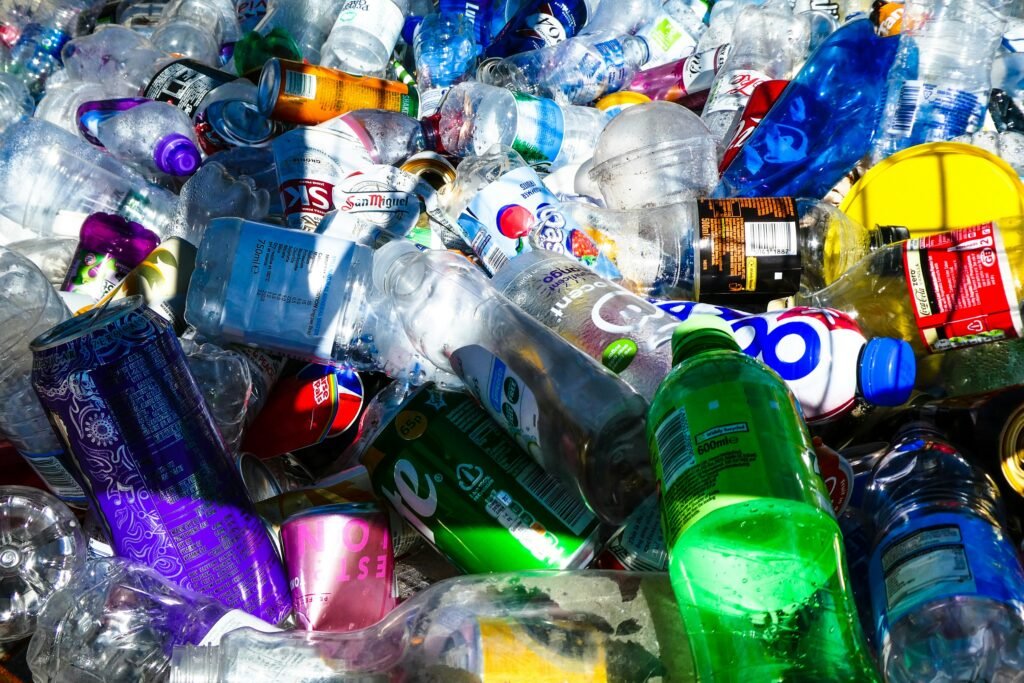Glass bottles are a common sight in our daily lives, whether it’s the soda bottle at your favorite restaurant or the wine bottle from last night’s celebration. But have you ever wondered what happens to these bottles after we’re done with them? In this article, we will explore the world of sustainable glass bottle recycling solutions and how they contribute to a more eco-friendly future. From the process of collecting and sorting glass bottles to the innovative methods of turning them into new products, we will uncover the fascinating journey that these bottles take on their path towards sustainability. Get ready to be amazed by the possibilities of glass bottle recycling and the positive impact it can have on our planet!

This image is property of images.unsplash.com.
Benefits of Glass Bottle Recycling
Reduction of waste in landfills
Glass bottle recycling plays a crucial role in reducing waste in landfills. By diverting glass bottles from the landfill, you contribute to the conservation of precious landfill space. Glass is not biodegradable, so when it ends up in landfills, it stays there for thousands of years. Recycling glass bottles prevents them from taking up space in these already limited areas.
Conservation of resources
Recycling glass bottles helps conserve valuable resources. Manufacturing glass from raw materials requires large amounts of energy and resources, including sand, soda ash, and limestone. By recycling glass bottles, these resources can be saved. Additionally, recycling glass reduces the need for new mining operations and helps preserve natural habitats.
Energy conservation
One of the significant benefits of glass bottle recycling is the conservation of energy. When glass is recycled, it requires less energy to melt compared to manufacturing glass from scratch. This difference can be significant, with the recycling process consuming around 25% less energy. By conserving energy, we can reduce our reliance on fossil fuels and decrease greenhouse gas emissions.
Reduction in carbon emissions
Glass bottle recycling contributes to the reduction of carbon emissions. The process of manufacturing glass from raw materials releases significant amounts of carbon dioxide into the atmosphere. Recycling glass bottles helps decrease the need for new glass production, thereby reducing carbon emissions associated with the manufacturing process. By choosing to recycle your glass bottles, you can make a positive impact on climate change.
Challenges in Glass Bottle Recycling
Contamination
Contamination is one of the challenges faced in glass bottle recycling. Glass bottles often become contaminated with other materials, such as plastic or food waste, during the collection and sorting process. Contamination can compromise the quality of recycled glass and make it unsuitable for future use in glass production. Efforts need to be made to educate individuals about proper recycling practices to minimize contamination.
Different types of glass
Another challenge is dealing with different types of glass. Glass bottles come in various colors, compositions, and thicknesses, which can complicate the recycling process. Each type of glass requires specific treatment and processing methods. It is essential to separate glass bottles based on their composition and color to achieve high-quality recycled glass.
Collection and transportation
Collecting and transporting glass bottles for recycling can pose logistical challenges. Glass is heavy and delicate, making it more challenging to handle and transport compared to other recyclable materials. Specialized containers and vehicles are needed to safely collect and transport glass bottles. Efficient collection systems and strategic placement of collection points are necessary to ensure convenient recycling for consumers.
Lack of awareness
Lack of awareness among the general public about the importance of glass bottle recycling is another significant challenge. Many people may not be fully aware of the benefits of recycling glass bottles or the proper recycling process. Educating the public through awareness campaigns and informative materials can help increase participation in glass bottle recycling programs.
The Importance of Sustainable Glass Bottle Recycling
Preservation of natural resources
Sustainable glass bottle recycling plays a vital role in preserving natural resources. By recycling glass bottles, we reduce the need for raw materials, such as sand and soda ash, which are finite resources. Preserving these natural resources ensures their availability for future generations and reduces the environmental impact of extraction and processing.
Reduction of pollution
Glass bottle recycling helps to reduce pollution associated with glass production. Extracting raw materials for glass manufacturing can lead to deforestation, soil erosion, and water pollution. Recycling glass bottles reduces the demand for new glass, thereby minimizing the negative environmental effects of mining and extraction processes.
Promotion of circular economy
Glass bottle recycling promotes the concept of a circular economy. Instead of following a linear model of production and disposal, recycling glass bottles allows them to be continuously reused in the manufacturing process, closing the loop. Embracing a circular economy approach ensures that materials remain in circulation for as long as possible, reducing waste and conserving resources.
Environmental education
Sustainable glass bottle recycling creates opportunities for environmental education. It raises awareness about the importance of recycling and encourages individuals to adopt eco-friendly practices. Through educational initiatives and programs, people can learn about the environmental impact of glass bottle waste and how recycling can make a meaningful difference.
Best Practices for Glass Bottle Recycling
Source separation
Source separation is a crucial best practice in glass bottle recycling. It involves separating glass bottles from other types of waste at the point of disposal. Clear instructions and easily accessible recycling bins can encourage individuals to separate their glass bottles correctly, increasing the quality of recycled glass.
Proper glass sorting
Proper glass sorting is essential to ensure high-quality recycled glass. Different types of glass bottles need to be sorted based on their color and composition. This sorting process helps maintain the purity of each glass type, facilitating effective recycling and manufacturing of new glass products.
Contamination prevention
Preventing contamination is vital to ensure the quality of recycled glass. Educating the public about what can and cannot be recycled with glass bottles is essential. Properly rinsing glass bottles before recycling and removing any caps or other non-recyclable parts can help reduce contamination.
Effective collection methods
Implementing effective collection methods is crucial to maximize glass bottle recycling rates. Providing easily accessible collection points and clear instructions on recycling procedures can encourage individuals to participate in the recycling process. Regular collection and transportation schedules ensure that glass bottles do not accumulate at recycling points, maintaining a smooth flow of the recycling process.

This image is property of images.unsplash.com.
Innovative Technologies for Glass Bottle Recycling
Optical sorting systems
Optical sorting systems use advanced technology to automatically detect and sort glass bottles based on their color, shape, and composition. These systems can accurately separate different types of glass, improving recycling efficiency and increasing the purity of recycled glass. Optical sorting systems help overcome the challenges associated with manual sorting and minimize contamination.
Glass beneficiation technologies
Glass beneficiation technologies focus on enhancing the quality of recycled glass. These technologies remove impurities, such as paper labels, glue, or plastic residue, from glass bottles, improving the recycling process. By utilizing these technologies, the recycled glass can match the quality standards required for manufacturing new glass products.
Glass foam manufacturing
Glass foam manufacturing is an innovative technique that transforms recycled glass bottles into lightweight, insulating foams. These foams can have applications in the construction industry, providing energy efficiency and reducing the need for conventional insulation materials. Glass foam manufacturing offers a sustainable and eco-friendly alternative for utilizing recycled glass.
Eco-friendly bottle design
Innovative eco-friendly bottle design focuses on reducing the environmental impact of glass bottles from the start. This includes using lighter-weight glass, reducing the amount of raw materials required, and implementing efficient bottle shapes that optimize packaging and transportation. Eco-friendly bottle design aims to minimize waste and improve the overall sustainability of glass packaging.
Government Initiatives for Glass Bottle Recycling
Mandatory bottle deposit schemes
Mandatory bottle deposit schemes require consumers to pay a modest deposit when purchasing beverages in glass bottles. The deposit is refunded when the bottle is returned for recycling. This system motivates individuals to participate in glass bottle recycling and ensures the return of used bottles to dedicated collection points.
Extended producer responsibility (EPR) programs
EPR programs hold producers responsible for the entire life cycle of their products, including the proper management of waste generated. By implementing EPR programs for glass bottles, producers are incentivized to design packaging that is easier to recycle and to take responsibility for the collection and recycling of their products.
Financial incentives
Financial incentives, such as tax breaks or grants, can encourage businesses and individuals to invest in glass bottle recycling initiatives. These incentives help offset the costs associated with collection, transportation, and processing of glass bottles, making recycling economically viable for stakeholders.
Regulatory frameworks
Regulatory frameworks play a crucial role in promoting and enforcing glass bottle recycling. Governments can establish recycling targets, set standards for recycled glass quality, and enforce penalties for non-compliance. By implementing clear regulations and monitoring systems, governments can drive the adoption of sustainable glass bottle recycling practices.

This image is property of images.unsplash.com.
Collaborations and Partnerships in Glass Bottle Recycling
Public-private partnerships
Public-private partnerships bring together the resources and expertise of the government and private entities to implement effective glass bottle recycling programs. These collaborations can involve joint initiatives, shared infrastructure, and knowledge exchange, fostering innovation and maximizing the efficiency of recycling efforts.
Cooperation between glass manufacturers and recyclers
Collaboration between glass manufacturers and recyclers is essential to create a closed-loop system for glass bottle production and recycling. Manufacturers can work closely with recyclers to ensure the demand for recycled glass and to develop sustainable manufacturing techniques that optimize the use of recycled materials.
Collaboration with retailers and hospitality industry
Engaging retailers and the hospitality industry is critical to increasing glass bottle recycling rates. Collaboration can involve the placement of recycling bins in stores and restaurants, educating staff about proper recycling practices, and incentivizing customers to return glass bottles for recycling. By working together, these sectors can make a significant impact on glass bottle recycling efforts.
International cooperation
International cooperation in glass bottle recycling can facilitate knowledge sharing, best practice exchange, and joint research and development. Collaborations between countries can help address global challenges related to glass bottle recycling and promote the adoption of sustainable practices worldwide.
Case Studies: Successful Glass Bottle Recycling Models
Deposit return systems in Germany
Germany has implemented a highly successful deposit return system for glass bottles. Consumers pay a deposit when purchasing beverages, which is refunded when the bottles are returned to designated collection points. This system has led to high recycling rates, with over 98% of glass bottles being recycled and utilized in the production of new glass products.
Circular economy solutions in Sweden
Sweden has embraced circular economy principles in its glass bottle recycling efforts. The country promotes closed-loop systems, where glass bottles are continuously recycled and returned to the manufacturing process. Furthermore, innovative technologies, such as optical sorting systems and glass beneficiation technologies, are utilized to maximize the quality and value of recycled glass.
Efficient glass container recycling in Australia
Australia has made significant progress in glass container recycling through efficient collection and processing methods. The country has established nationwide container deposit schemes that incentivize consumers to recycle glass bottles and other beverage containers. Effective collaboration between government, industry, and consumers has led to high recycling rates and the creation of sustainable recycling infrastructure.
Community-based initiatives in the United States
Various community-based initiatives in the United States have successfully increased glass bottle recycling rates. These initiatives involve partnerships between local organizations, businesses, and residents to create a comprehensive and accessible recycling system. Programs include education campaigns, convenient drop-off points, and collaboration with recycling facilities for efficient processing.
Social Benefits of Sustainable Glass Bottle Recycling
Job creation
Sustainable glass bottle recycling programs create employment opportunities. The collection, sorting, and processing of glass bottles require a dedicated workforce. By expanding recycling initiatives, more jobs can be created, contributing to the local economy and improving livelihoods.
Support for local economies
Sustainable glass bottle recycling can support local economies in multiple ways. It reduces the reliance on importing raw materials by utilizing recycled glass locally. The development of recycling infrastructure and related industries further stimulates economic growth and strengthens local supply chains.
Community engagement
Glass bottle recycling encourages community engagement and participation. By providing easily accessible recycling options and raising awareness about recycling benefits, individuals feel empowered to contribute to a cleaner and more sustainable environment. Community engagement initiatives foster a sense of shared responsibility and can strengthen community bonds.
Improvement of waste management infrastructure
Investing in sustainable glass bottle recycling helps improve overall waste management infrastructure. By prioritizing recycling, communities can develop efficient collection systems, establish recycling facilities, and optimize waste management practices. This improvement benefits not only glass bottle recycling but also the management of other waste streams.
Future Outlook and Innovations in Glass Bottle Recycling
Advancements in recycling technologies
Ongoing advancements in recycling technologies promise to enhance the efficiency and effectiveness of glass bottle recycling. Improved sorting systems, advanced glass cleaning techniques, and optimized recycling processes will contribute to higher-quality recycled glass and increased recycling rates.
Recycling of complex glass products
Future innovations in glass bottle recycling will focus on the recycling of complex glass products, such as windowpanes and mirrors. These glass products often contain multiple layers and coatings, making them challenging to recycle. Research and development efforts are underway to develop specialized processes for their recycling, further closing the glass waste loop.
Integration of Internet of Things (IoT)
The integration of the Internet of Things (IoT) technology can revolutionize glass bottle recycling. Smart bins equipped with sensors can track the fill level of collection containers, optimize collection routes, and provide real-time data on recycling rates. The IoT can streamline the recycling process, making it more efficient and cost-effective.
Waste-to-energy solutions
Innovative waste-to-energy solutions can provide alternative uses for glass bottle waste. Through advanced technologies, glass waste can be converted into energy sources, such as biofuels or electricity. These waste-to-energy solutions offer an environmentally friendly way to utilize glass bottle waste while reducing reliance on fossil fuels.
Glass bottle recycling plays a significant role in addressing environmental concerns and promoting sustainable practices. By understanding the benefits, challenges, and best practices associated with glass bottle recycling, individuals, businesses, and governments can work together to create a more sustainable future. Through innovation, collaboration, and awareness, we can ensure that our glass bottles are continuously recycled, contributing to a cleaner and greener planet.



